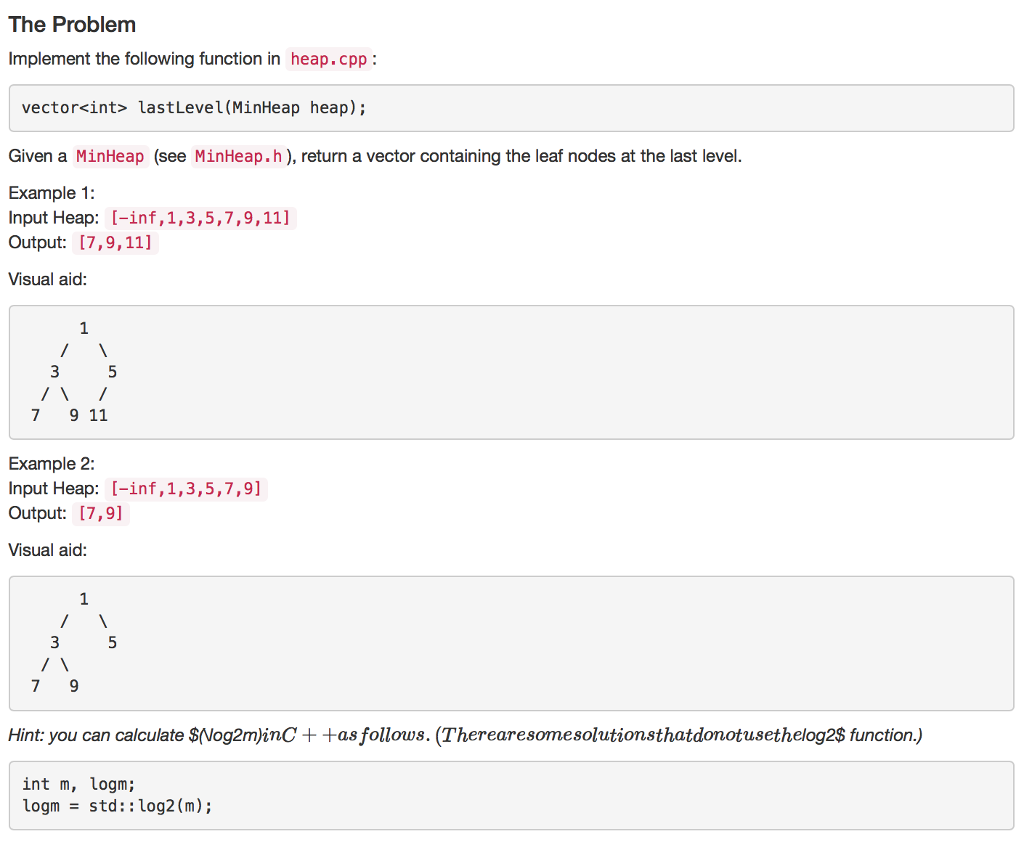Question: The code needs to go in heap.cpp the other files are just for reference //main.cpp #include #include #include #include MaxHeap.h #include MinHeap.h using namespace std;

The code needs to go in heap.cpp the other files are just for reference
//main.cpp
#include
using namespace std;
// Use this main() function to test your code. You may change things as you // wish here, this is for your own use. Please note: This code will not be used // for grading.
int main() { // Creating a heap vector
// Printing a heap cout
// Testing your answer vector // Checking correctness vector return 0; } //heap.cpp #include vector //MaxHeap.cpp #include "MaxHeap.h" MaxHeap::MaxHeap(const vector MaxHeap::MaxHeap() { int inf = numeric_limits void MaxHeap::buildHeap() { std::sort(elements.begin() + 1, elements.end(), std::greater void MaxHeap::heapifyDown(int index) { int length = elements.size(); int leftChildIndex = 2 * index; int rightChildIndex = 2 * index + 1; if (leftChildIndex >= length) return; // index is a leaf int maxIndex = index; if (elements[index] if ((rightChildIndex if (maxIndex != index) { // need to swap int temp = elements[index]; elements[index] = elements[maxIndex]; elements[maxIndex] = temp; heapifyDown(maxIndex); } } void MaxHeap::heapifyUp(int index) { if (index int parentIndex = index / 2; if (elements[parentIndex] void MaxHeap::insert(int newValue) { int length = elements.size(); elements.push_back(newValue); heapifyUp(length); } int MaxHeap::peek() const { return elements.at(1); } int MaxHeap::pop() { int length = elements.size(); int p = -1; if (length > 1) { p = elements[1]; elements[1] = elements[length - 1]; elements.pop_back(); heapifyDown(1); } return p; } void MaxHeap::print() const { if (elements.size() > 1) { int length = elements.size(); cout //Maxheap.h #ifndef MAXHEAP_H #define MAXHEAP_H #include class MaxHeap { public: /** * @elements: stores the integers in the heap. */ vector /** * @heapifyDown: performs heapifyDown algorithm starting from index all the * way down the heap. */ void heapifyDown(int index); /** * @heapifyUp: performs heapifyUp algorithm starting from index all the way * up the heap. */ void heapifyUp(int index); /** * @buildHeap: this is the buildHeap algorithm. It is called when a new heap * object is created. */ void buildHeap(); /** * Constructor: constructs a MaxHeap from the given integer vector. */ MaxHeap(const vector /** * Empty constructor: constructs an empty MaxHeap. */ MaxHeap(); /** * @insert: inserts an integer into the MinHeap. */ void insert(int newValue); /** * @peek: returns the value of the element at the top of the heap. Does not * modify the heap. */ int peek() const; /** * @pop: returns the value of the element at the top of the heap and removes * it from the heap. */ int pop(); /** * @print: prints out the array of elements in the heap. */ void print() const; }; #endif // MAXHEAP_H //MinHeap.cpp #include "MinHeap.h" MinHeap::MinHeap(const vector MinHeap::MinHeap() { int inf = numeric_limits void MinHeap::buildHeap() { std::sort(elements.begin() + 1, elements.end()); } void MinHeap::heapifyDown(int index) { int length = elements.size(); int leftChildIndex = 2 * index; int rightChildIndex = 2 * index + 1; if (leftChildIndex >= length) return; // index is a leaf int minIndex = index; if (elements[index] > elements[leftChildIndex]) { minIndex = leftChildIndex; } if ((rightChildIndex elements[rightChildIndex])) { minIndex = rightChildIndex; } if (minIndex != index) { // need to swap int temp = elements[index]; elements[index] = elements[minIndex]; elements[minIndex] = temp; heapifyDown(minIndex); } } void MinHeap::heapifyUp(int index) { if (index int parentIndex = index / 2; if (elements[parentIndex] > elements[index]) { int temp = elements[parentIndex]; elements[parentIndex] = elements[index]; elements[index] = temp; heapifyUp(parentIndex); } } void MinHeap::insert(int newValue) { int length = elements.size(); elements.push_back(newValue); heapifyUp(length); } int MinHeap::peek() const { return elements.at(1); } int MinHeap::pop() { int length = elements.size(); int p = -1; if (length > 1) { p = elements[1]; elements[1] = elements[length - 1]; elements.pop_back(); heapifyDown(1); } return p; } void MinHeap::print() const { if (elements.size() > 1) { int length = elements.size(); cout //MinHeap.h #ifndef MINHEAP_H #define MINHEAP_H #include class MinHeap { public: /** * @elements: stores the integers in the heap. */ vector /** * @heapifyDown: performs heapifyDown algorithm starting from index all the * way down the heap. */ void heapifyDown(int index); /** * @heapifyUp: performs heapifyUp algorithm starting from index all the way * up the heap. */ void heapifyUp(int index); /** * @buildHeap: this is the buildHeap algorithm. It is called when a new heap * object is created. */ void buildHeap(); /** * Constructor: constructs a MinHeap from the given integer vector. */ MinHeap(const vector /** * Empty constructor: constructs an empty MinHeap. */ MinHeap(); /** * @insert: inserts an integer into the MinHeap. */ void insert(int newValue); /** * @peek: returns the value of the element at the top of the heap. Does not * modify the heap. */ int peek() const; /** * @pop: returns the value of the element at the top of the heap and removes * it from the heap. */ int pop(); /** * @print: prints out the array of elements in the heap. */ void print() const; }; #endif // MINHEAP_H
Step by Step Solution
There are 3 Steps involved in it

Get step-by-step solutions from verified subject matter experts


